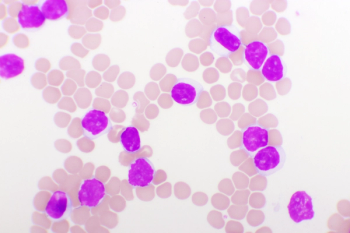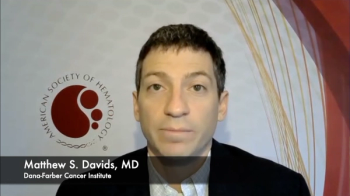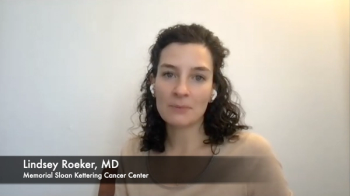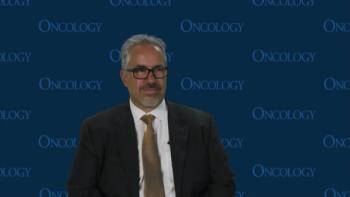
Nina Shah, MD, touched on novel immunotherapies and other emerging therapies for patients with multiple myeloma.

Your AI-Trained Oncology Knowledge Connection!


Nina Shah, MD, touched on novel immunotherapies and other emerging therapies for patients with multiple myeloma.

Using the International Prognostic Scoring System (IPSS) score and JAK2 mutation status, thrombosis risk could potentially be identified for patients with primary myelofibrosis.

A cohort study did not identify strong associations between outpatient or inpatient neutropenia management and increased bacteremia incidence, treatment delays, or worse health-related quality of life for pediatric patients with acute myeloid leukemia.

A non inferiority design was presented at ASH 2021 for acalabrutinib plus venetoclax in treatment-naive chronic lymphocytic leukemia or small lymphocytic leukemia.

Susan M. O’Brien, MD, highlights ongoing trials from 2021 examining combination therapies for patients with chronic lymphocytic leukemia.

Matthew S. Davids, MD, spoke about which abstracts presented at ASH 2021 he felt were most important.

Nina Shah, MD, details the process to choose optimal therapeutic options for patients with relapsed/refractory multiple myeloma.

Nina Shah, MD, on BCMA-directed treatments for patients with multiple myeloma.

Susan M. O’Brien, MD, discusses novel mechanisms of action and BTK inhibitors for patients with chronic lymphocytic leukemia.

Mehmet Sitki Copur, MD, gives his perspective on liquid biopsies and how they can be utilized in gastrointestinal cancer.

Nina Shah, MD, discussed how adverse events impact treatment decision-making for patients with multiple myeloma.

Patient data from 4 clinical trials suggests HER2-low–positive tumors can be seen as a new breast cancer subgroup, specifically distinct from HER2-zero tumors.

Phase 3 data indicated that primary tumor resection followed by systemic treatment produced higher 60-day mortality vs systemic treatment alone for patients with metastatic colorectal cancer.

Early relapsed appears to be an important predictor of survival among patients with mantle cell lymphoma.

Although findings suggest that close or positive surgical margins are associated with a higher risk of poor outcomes in salivary gland cancer, it did not appear to be an independent factor for poor outcomes after adjusting for tumor stage, histologic risk group, and adjuvant radiotherapy use.

Lindsey Roeker, MD, spoke about data presented at ASH 2021 and what she thought to be most interesting.

FDA fast track designation comes based on overall survival improvements from a phase 1 trial investigating LioCyx-M004 infusions in primary HBV-related hepatocellular carcinoma.

Susan M. O’Brien, MD, on common toxicities and adverse effects when treating patients with chronic lymphocytic leukemia.

Research suggests age-standardized incidence and death rates for patients with bladder cancer decreased globally between 1990 and 2019.

CancerNetwork® reflects on developments in the chronic lymphocytic leukemia space throughout 2021 and potential future events that may take place in 2022 with Matthew S. Davids, MD, MMSc.

In the final part of the small cell lung cancer podcast series, CancerNetwork® and Wade Iams, MD, discuss the future of treating patients with this disease.

Nina Shah, MD, discusses how to properly navigate treatment plans for patients with relapsed/refractory multiple myeloma.

Jennifer A. Woyach, MD, spoke about why it’s important to use newer therapies instead of chemoimmunotherapy for patients with chronic lymphocytic leukemia.

Remedying gaps in knowledge and implementing strategies for financial toxicity mitigation are important for optimizing breast cancer treatment.

The conversation with Jun Gong, MD, focused on the evolving relationship between oncologists who treat prostate cancer and genetic counselors.

At ASH 2021, CancerNetwork® spoke with Ruben Mesa, MD, of UT Health San Antonio MD Anderson Cancer Center, about what changes in the treatment of myelofibrosis stood out to him most.

Philip S. Low, PhD, discusses the obstacles he overcame while creating pafolacianine and what other cancers he hopes will be improved with the use of this agent.

Susan M. O’Brien, MD, on combination therapies for treating patients with chronic lymphocytic leukemia.

CancerNetwork® spoke with Rafael Fonseca, MD, about the rationale for a simulation using real-world data sets to compare the utility of daratumumab-containing regimens as either frontline or second-line therapy.

Luciano Costa, MD, PhD, spoke about how the results in the final primary analysis of the MASTER trial with daratumumab, carfilzomib, lenalidomide, and dexamethasone in multiple myeloma were not what he expected.